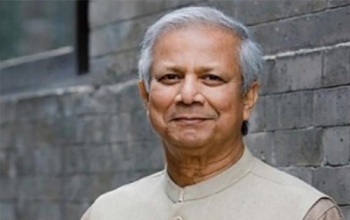On the eve of returning to Bangladesh to lead an interim government, Nobel laureate Dr Muhammad Yunus emphasised the critical need to restore law and order in an interview with Indian Private Television Network NDTV. He stated that ensuring stability in Bangladesh is essential, as its instability could have dangerous repercussions for neighbouring regions, including India’s Northeast and Myanmar.
Dr. Yunus remarked, “It’s important to remember that Bangladesh is home to 170 million people, two-thirds of whom are young. Many have never had the chance to vote. Restoring this right will be our primary task. “We must assure them that democracy will return and they will play a role in it.”
He gave this interview to India’s private television channel NDTV on Wednesday. Responding to a question, Dr Yunus noted that the lack of law and order in the country during the autocratic rule of former Prime Minster Sheikh Hasina had led to the current instability. The breakdown in law enforcement had intensified calls for the Prime Minister’s resignation, culminating in her stepping down. The populace is now celebrating this development, marking it as the second independence day after December 16, 1971—this time from a tyrannical government. According to Dr Yunus, the nation is now tasting freedom.
Dr Yunus believes that the current celebrations, despite causing some instability, will eventually lead to stability. In response to another question from NDTV, the Nobel laureate claimed that by depriving the country of democracy, Sheikh Hasina had kept it unstable. He stressed that democracy is the antidote to instability and expressed hope that the people of Bangladesh will now experience true democracy and witness transparent elections. This, he said, is the revolution’s main goal.
Addressing concerns about Islamic fundamentalism, extremism, and incidents like the destruction of Bangabandhu Sheikh Mujibur Rahman’s statues, Dr. Yunus placed the blame squarely on Sheikh Hasina. He accused her of tarnishing her father’s image and embittering the public to the point of such actions. This, he said, is Hasina’s responsibility.
Dr Yunus stated, “Restoring law and order is the top priority now, something Hasina failed to achieve, leading to her government’s downfall. If the rule of law had been maintained, this wouldn’t have happened. The current situation is a continuation of Hasina’s governance. We must ensure that after the celebrations, people return home, focus on work, and engage freely.”
When asked about Sheikh Hasina’s future and whether she would stay in India or move to another country, Dr Yunus said he couldn’t comment as he had not spoken to anyone about it, but staying in India would not be appropriate.
As the potential head of the interim government, Dr Yunus highlighted that a truly democratic Bangladesh would ensure the safety and significance of its minorities. Their voices would be heard and respected, and they would have the right to vote and choose their representatives, similar to the rights enjoyed by minorities in India.










